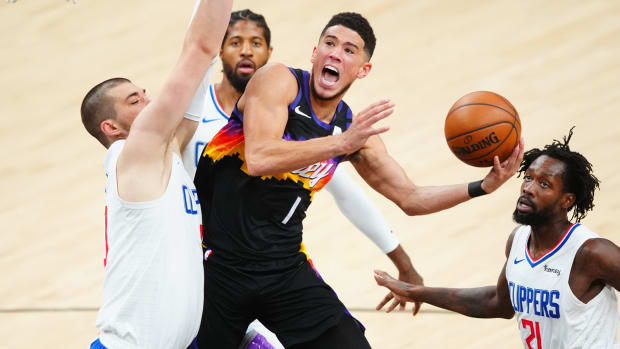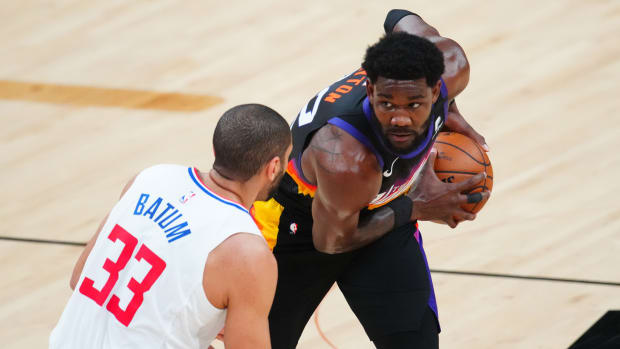For former Suns GM Ryan McDonough, there will be emotions this week, and in the years to come. But no bitterness or regrets.
Welcome to the Morning Shootaround, where every weekday you’ll get a fresh, topical column from one of SI.com’s NBA writers: Howard Beck on Mondays, Chris Mannix on Tuesdays, Michael Pina on Wednesdays, Chris Herring on Thursdays and Rohan Nadkarni on Fridays.
The man who put Devin Booker in a Suns uniform, who drafted Deandre Ayton, acquired Mikal Bridges and put a woebegone franchise on the path to redemption—only to be jettisoned just before reaching the summit—is feeling all kinds of emotions amid their dazzling, magical run to the Western Conference finals. But maybe not the emotions you’d expect.
Not bitterness, not frustration, not anger, not regret. A pang of wistfulness? Sure. A little FOMO? Yes. But mostly, Ryan McDonough feels pride.
“A lot of people have asked if it’s bittersweet to watch those guys play,” the former Suns general manager, who was fired in October 2018, said in a telephone interview last week. “And I say, really, it’s just sweet. There’s no bitterness about it. I’d say it’s exciting.”
Also, nerve-racking and gratifying and fun—even if McDonough is now just a spectator, living in the Phoenix area and working as a television and radio analyst until the next NBA opportunity arises.
On Sunday, McDonough watched the Suns make their first conference finals appearance since 2010—a 120–114 victory over the Clippers—a feat made all the more surprising by the fact the Suns hadn’t made the playoffs, period, since that same '09–10 season.
They’re here now, and a legit threat to make the Finals, because of a thousand different decisions, made over multiple years, many of them after McDonough’s departure. James Jones, his successor as GM, deftly massaged the roster and made two colossal acquisitions: Monty Williams as head coach in 2019, and Chris Paul as point guard in '20. Their leadership, combined with the young talent, launched the Suns from lottery fixture to title contender faster than anyone could have predicted—and earned Jones the Executive of the Year award from his peers.
McDonough is as impressed as anyone.
“I think they’ve made a number of good moves, starting with hiring Monty Williams,” he said. “I don’t think anybody has done a better job than Monty Williams, especially this past season.”
Though McDonough surely would have liked to finish the job himself, he knows all too well—as a 15-year veteran of NBA front offices, and the son of sportswriting legend Will McDonough—the volatility of his chosen field.
NBA teams dispose of GMs and coaches as easily as they toss aside flat basketballs—as we were reminded again last week by the Pelicans (who fired coach Stan Van Gundy), the Wizards (who dismissed coach Scott Brooks) and the Mavericks (who bid farewell to GM Donnie Nelson and coach Rick Carlisle). There are seven head coach vacancies today, with potentially more to come. It’s a cold, callous league, with little room for sentimentality or patience.
It’s much harder, however, for the ousted leaders to sever their emotional ties. McDonough spent 5 ½ years as the Suns’ GM, following a decade in the Celtics front office, under Danny Ainge. He’s still rooting for friends in both places—“a special place in my heart,” he said. But surely more so for Booker, Ayton and Bridges, the young guns who fueled the Suns’ rapid rise.
Every player a GM drafts, signs or acquires is a personal investment of sorts—a physical manifestation of basketball faith. Their failures sting more. Their triumphs are nirvana. And this Suns core is positively heavenly.

Booker, 24, has become an elite scorer and playmaker, an All-Star and borderline All-NBA guard. Ayton, 22, is fast developing into one of the game’s best two-way centers. The 24-year-old Bridges is already one of the best 3-and-D wings in the league, and still evolving. The trio combined for 74 points and 23 rebounds on Sunday, earning the victory without Paul, who is out due to the league’s COVID-19 protocols.
“What's been a pleasant—I don't think it’s a surprise, but kind of an affirmation of what we thought—is just how good those guys have looked in their first playoff run,” McDonough said last week. “And none of them had played a playoff game before a couple weeks ago.”
In the span of 22 days, the young Suns ousted the defending champion Lakers (albeit with an injured LeBron James and Anthony Davis), then swept the Nuggets and their newly crowned MVP, Nikola Jokić. Ayton, in particular, earned his stripes in the second round, flustering Jokić at times and in turn throttling the Nuggets’ offense.
“For them to go 8–2 in those series—and for Devin, Deandre, Mikal and the entire team to play very well—I think it would be difficult not to be impressed,” McDonough said.
This was always the plan, or at least the hope, when the Suns plunged into their rebuilding phase during McDonough’s tenure: Absorb a few years of losing. Accumulate assets. Draft smartly. And then, eventually, fill out the rotation with steady veterans, as Jones did with Paul and Jae Crowder.
“My plan was not to draft in the lottery forever,” McDonough quipped. “It was to find a core of talented young players, and then supplement them with veterans. And organizationally, [Jones and his staff] have done a really nice job of that.”
The Suns averaged 23 wins over McDonough’s final three seasons, and though he won’t say it was by design (that would be tanking, a no-no), he does concede that the Warriors’ overwhelming dominance made the slow build a more palatable path.
“I’ll say this: The decision to load up on young players and draft picks was intentional and strategic,” McDonough said. “And factoring into that decision was certainly that, in our own conference, in our own division, the Golden State Warriors had assembled one of the best teams of all time, and their players were in their prime. … So we didn’t want to foolishly burn through assets or do things that would cause us to be better, but still lose to the Warriors.”

The selection of Ayton at No. 1 in 2018 will always be a source of debate, because of the two phenoms taken after him: Luka Dončić (at No. 3) and Trae Young (at No. 5). But Ayton’s stout performance this spring softens the discussion a bit. As does the presence of Booker, whose elite scoring and playmaking might not have meshed well with the ball-dominant styles of Dončić and Young.
“I think Deandre's defensive potential could be a little bit of a differentiator, and also his rebounding,” McDonough said, explaining the reasons for taking Ayton over Dončić and Young. “Would they have the ball as much, and do the same thing if they were in the backcourt on the same team as Devin Booker? I don't know. We’ll obviously never know that.”
Regardless, the selections of Booker (13th in 2015) and Bridges (10th in '18) are major points of pride for McDonough, given that both were drafted late in the lottery. The Suns targeted Booker from the start that spring, believing he had far greater potential than he’d shown in his one season at Kentucky.
“We thought he'd be gone” by the time the Suns picked, McDonough said. “When Devin Booker was still on the board, there was no question we were taking him. We had high hopes for the young man, but I think he's even exceeded our lofty expectations for him.”
McDonough felt similarly strongly about Bridges—so much so that he traded an unprotected first-round pick (via the Heat), plus the Suns’ pick (at 16) to acquire Bridges’s draft rights from the 76ers.
“I personally had no doubt that he was going to reach his ceiling, whatever it is,” McDonough said of Bridges, “and I think there's still room for growth and upside there. But he's really developed his offensive game. And I think he gives them another versatile threat on both ends of the court.”
Now those players stand seven wins from the title, and McDonough believes they’re fully capable of winning it. “I think they should be the favorite in the Western Conference finals,” he said, though that could change if the Clippers get back Kawhi Leonard during the series.
That McDonough didn’t get the chance to finish what he started is hardly unique. Nor is the dynamic of one GM building on the work of his predecessor.
In Philadelphia, Daryl Morey is reaping the benefits of two All-Stars (Joel Embiid and Ben Simmons) drafted by his predecessors, Sam Hinkie and Bryan Colangelo. In Milwaukee, Jon Horst is riding the talents of Giannis Antetokounmpo and Khris Middleton, both acquired by John Hammond (although Horst was part of Hammond’s staff).
Bob Myers gets credit for three Warriors titles, but the Splash Brothers—Steph Curry and Klay Thompson—were both drafted by Larry Riley, well before Myers became GM in 2012. Masai Ujiri acquired the player (Kawhi Leonard) who fueled the Raptors’ 2019 championship, but that moment doesn’t happen without three players he inherited from Colangelo: Kyle Lowry and Jonas Valančiūnas, who started for that title team; and DeMar DeRozan, who was flipped for Leonard.
Heck, go back to the 1990s, and you’ll find Bulls GM Jerry Krause earning both credit and scorn for building six title teams, while the most important piece—Michael Jeffrey Jordan—was drafted by his predecessor, Rod Thorn.
But Thorn didn’t get the glory or the six rings, and if there’s a Suns championship on the horizon, well, McDonough will likely watch it from his couch.
“We really went through the muck, so to speak,” McDonough said of his tenure, “and we weren’t able to make it out the other side. Sure, I’d love to be there watching Devin and Deandre and Mikal, and the entire franchise thrive in person.”
So yes, there will be emotions this week, and in the years to come. But no bitterness or regrets.
“That’s what happens in the NBA,” McDonough said. “You kind of know what you sign up for going into it.”
More NBA Playoffs Coverage: